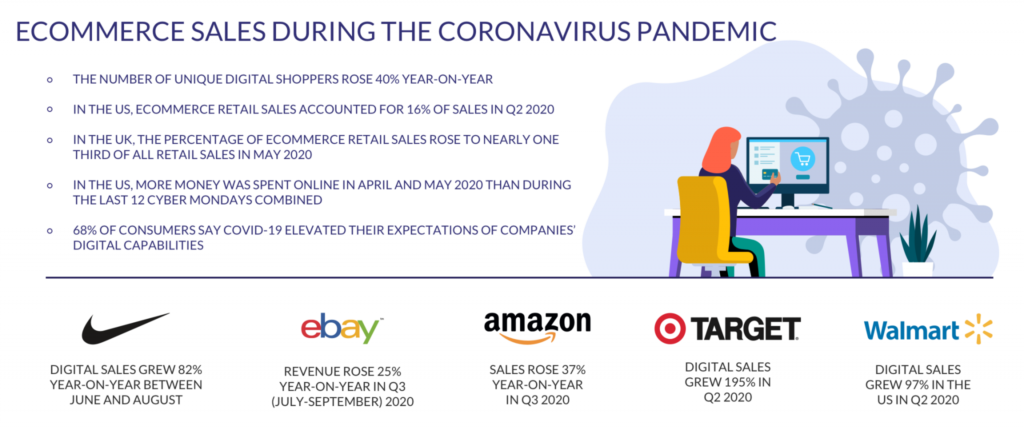At the onset of COVID, companies made a mad rush to incorporate or enhance e-commerce into their businesses. There was a measurable benefit as e-commerce transactions and sales increased significantly from previous years. More people were buying online (36%) than in the last year (28%); however, using or enhancing e-commerce did not prevent retail sales from declining. There was a shift in the buying mode from in-store to online, but the transition was not enough to maintain the overall retails sales, which shrank by 10.5% during the same period.

For most B2C and B2B businesses, the adoption of e-commerce is not difficult as they have products and services that can be configured on an e-commerce site. From simple examples of choosing, size, color, and design when it comes to clothing to complex configurators when you are pricing out a car insurance policy. Suppose your business uses a consultative sales engagement where a subject matter expert works with the customer to determine their needs to propose a solution. This kind of sales engagement makes it extremely difficult for the business to configure e-commerce engines to replicate their sales process. Over time machine learning and AI will make it possible to replicate these complex buyer journeys into e-commerce engines.
For now, unless you have lots of resources to create the configurators (like insurance companies) or you can package your product or services to cover the most common customer requirements (like lawn service packages), e-commerce can get very expensive for small businesses to create and get it right. Enacted poorly, businesses may miss the mark entirely for customers looking for specific products or services, offer poor value for package pricing, or miss out on bundling/upsell opportunities. They may also see higher return or cancellation rates, and lower customer satisfaction scores if customers select the wrong offering due to a lack of guidance in aligning their needs to your products or services.
E-commerce has lots of advantages, but out of the box, managing a complex sales engagement is not one of them. How can these businesses bring their buying journey online if the e-commerce engines are not quite there yet? The solution is not in next-generation e-commerce platforms but in the connectedness that comes with Marketing Automation platforms. For years Marketing Automation and CRM platform providers have improved their offering to enable better and track a customers buying journey. These companies have produced tools for accomplishing many tasks like sending emails, creating landing pages, and add bots to web pages. You can adapt this same technology to facilitate a complex sales process, and track every engagement.
A company could create a landing page for the complex product or service with a form that could do the first pass of qualification and forward the lead to the appropriate subject matter expert to complete the sales cycle. If that is too manual, they could add a bot on the same page to answer the top 20 questions asked by customers in the past, helping to qualify the prospect further and take care of simple replies. Once the customer is qualified and ready for purchase, you can send them to a simple e-commerce engine to complete the transaction.
This hybrid approach allows businesses to stay close to their customers and be aware of their changing requirements, while being agile enough to pivot their business to changing needs. If you depended on an e-commerce engine, you don’t have the ability to do an abandoned cart analysis without the right customer insights. Ultimately, using tools that Marketing Automation platforms provide allow you to interact with your customers during their buying cycle. This gives you insights to keep servicing them, not to mention growing their loyalty towards your business, something an e-commerce site can not do for you alone.
Contact us to learn more about Marketing Automation or our Lead Concierge Practice for managing your complex or consultative sales which are not easily served by e-commerce transactions.